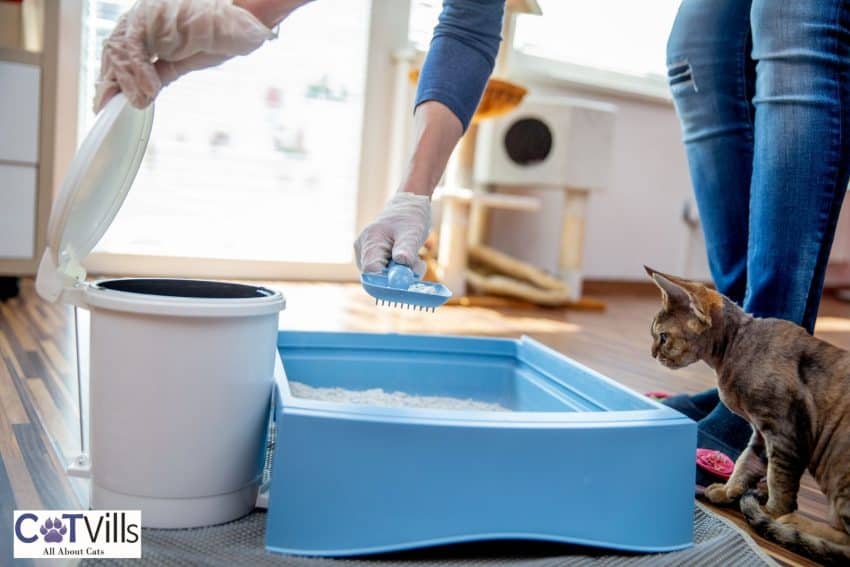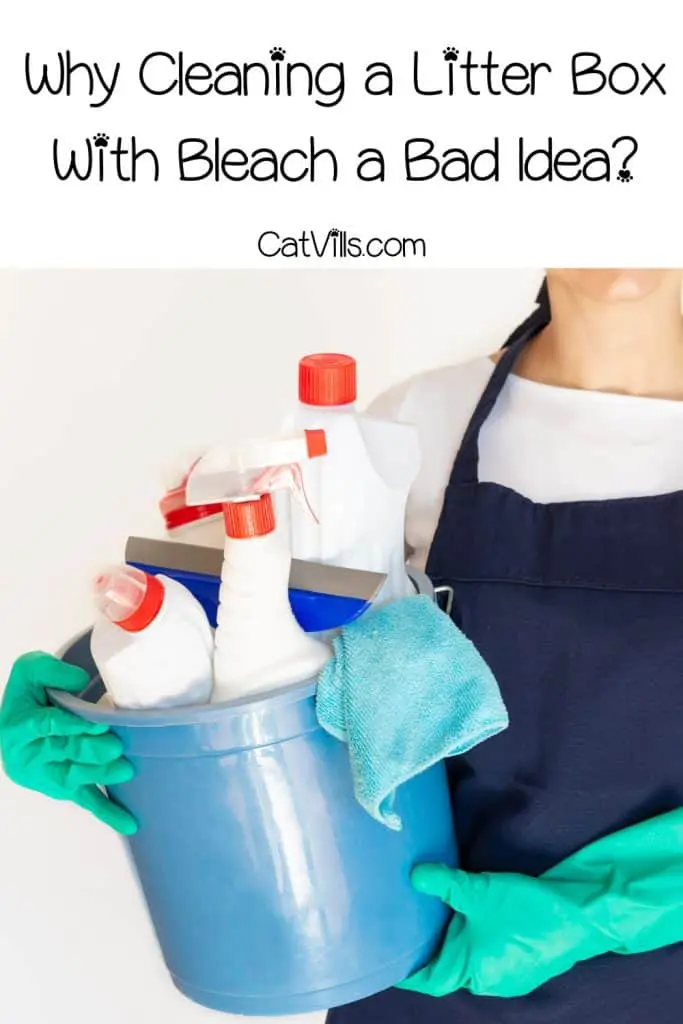Last Updated: 1 year ago
Many pet owners have asked me, “How do I clean a litter box with bleach?”
I always reply with a resounding answer that you shouldn’t do it.
After all, I’ve heard many horror stories and read enough studies to know it’s dangerous.
So I thought it’d be helpful to share what I’ve learned about these dangers and other related topics.
Why Cleaning a Litter Box With Bleach a Bad Idea?
Using bleach to clean a litter box is bad for several reasons, such as toxic gas, causing health problems, and dangerous smells. All of which I will go into more detail about in a minute.

At first glance, cleaning litter boxes with household bleach products seems like a good idea. It would be an easy way of ensuring your cat’s litter box was free of viruses and bacteria.
However, most pet owners don’t realize the dangers of using bleach. I certainly didn’t when first considering it.
Thankfully, I’ve spent time reading studies to learn about bleach’s impact on felines. Here’s a quick overview of what I’ve found that I want to share with other cat parents.
#1 Bleach Mixed With Cat Urine Creates Toxic Gas
I was shocked when reading bleach mixed with cat urine can create chlorine gas. It’s a gas formed when combining bleach with ammonia.
You’re probably asking where the ammonia comes from. It stems from your cat’s urine, creating a dangerous situation for owners who intend to use a bleach solution.
Exposing yourself to chlorine gas can cause “watering of the eyes, runny nose and coughing.” It can even kill you in higher concentrations, which is a pretty scary thought!
Your cat isn’t immune to the effects, either. Low-level exposure can cause your cat to cough and result in eye and skin irritation.
Meanwhile, higher concentrations will result in rapid breathing, “blue coloring of the skin, fluid in the lungs, and pain in the chest”.
I’ve also learned from experience never to clean litter box containers with ammonia. It only adds to the smell of a dirty litter box.
#2 Ingestion Causes Health Issues
Toxic gas isn’t the only dangerous outcome of cleaning a litter box with bleach. Your cat is much more likely to ingest bleach and contract bleach poisoning from it.
In other words, the only way to avoid bleach poisoning is not to use it. So it would make a ton of sense to avoid it.
However, if you have used it without knowing the possible risks, there are some symptoms you can watch out for.
Cats who do ingest bleach will experience the following symptoms:
- Skin irritation
- Sore throat
- Vomiting
- Inappetence
- Abdominal pain
- Drooling
#3 Produces Lingering Chemical Smells
Cats are incredibly particular about their litter boxes. As a result, a litter box cleaned with bleach can cause a problem for your cat.
For instance, your could wonder, “why do cats like the smell of bleach?” Your cat will then ignore the box until the smell goes away.
And keep in mind their sense of smell is much more sensitive than yours, so even if you can’t smell it, your cat might.
This outcome becomes a massive issue for one simple reason. If they aren’t peeing inside the cat litter containers, they’re doing it somewhere else inside your home.
I had the misfortune of learning this firsthand. Of course, I didn’t use bleach, but I decided to try scented litter inside my cat’s litter box.
He stated his unhappiness by avoiding the box and peeing on my shoes. Since then, I have never tried messing with this litter box again and only use the unscented litter.
So, what can you use as a cleaning solution if bleach is not safe? Let’s take a look.
How to Clean a Litter Box Safely
We’ve now covered why learning how to clean a litter box with bleach is dangerous. Instead, it’s better to focus on a different method to deal with unclean litter boxes.
So let’s look at an alternative method of cleaning out these stinky litter box odors.
#1 Gather Supplies
Don’t start the cleaning process without grabbing the following supplies:

- Disposable gloves
- Face mask (Covid-19 mask works)
- Cleaning rag, a clean sponge, scrub brush, and a litter scoop
- Unscented, mild dish soap
- Trash bag
- Paper towels
- Vinegar (optional)
#2 Dump Out Your Litter Box
Once you get the supplies, dump your litter box into a trash bag. But don’t leave the trash bag filled with cat litter waste in your home for too long.
I learned the hard way how it could stink up an apartment. So please, learn from my mistake and put it on the curb immediately.
Check out “how to dispose of cat litter in an apartment” for tips about living in apartments with cat litter.
#3 Soak The Litter Box
Next, soak the litter box in warm water for a few minutes. I suggest adding a small amount of unscented dish soap to the warm water.
The dish soap will help loosen any debris left on your litter box’s sides or bottom. But please, use an unscented variety, or the smell will linger.
Some owners find it helpful to take it a step further by mixing in a small amount of vinegar. If you want to learn more about this process, check out “how to clean a litter box with vinegar.”
Here’s a video explaining how vinegar and water are cost-effective cleaning methods.
#4 Scrubbing Out Your Litter Box If Necessary
If soaking and rinsing your litter box didn’t clean it entirely, you need to scrub it. A sponge does the best job, but a rag or scrub brush is also effective.
However, put on a pair of rubber gloves before scrubbing. These gloves will protect you from any exposure to viruses or bacteria hiding in the cat toilet.
Anyone with a compromised immune system or who is pregnant should also wear a face mask. It’s an extra precaution against any health issues arising from the scrubbing process.
In my case, I find my COVID-19 mask works perfectly. I’m a little paranoid about my health, so this mask provides me with some extra comfort.
#5 Let The Box Dry
Let the box air dry, or use paper towels to ensure it’s completely water-free. If the box is wet, it’ll create nasty clumps when you refill it with litter.
Obviously, not an ideal outcome as it will just ruin your fresh litter and might put your cat off using the kitty litter box.
#6 Deodorize The Litter Box
Our last step isn’t necessary, but I always finish by deodorizing the litter box. My favorite method is pouring in a teaspoon of baking soda before adding fresh litter.
It’ll help prevent any lingering scents from causing issues for your cats. From there, your litter box should be ready for use.
Check out this video if you want more tips about keeping your litter box smell-free.
How Often Should You Clean a Litter Box?
Keeping a litter box clean will require cat owners to scoop it out daily. Otherwise, cats will become rather frustrated by the dirtiness of their bathroom areas.
But the method outlined in our previous section only needs to be done about every two weeks. I found it to be enough to keep my senior cat happy.
FAQs
IS BLEACH TOXIC TO CATS?
Bleach is toxic to cats when ingested and causes serious health issues. Some examples include skin irritation, vomiting, diarrhea, and in more severe cases, death.
WHY DO CATS GO CRAZY WHEN THEY SMELL BLEACH?
Cats go crazy when they smell bleach because it has a similar odor to animal pee. Your cat will then feel the need to mark its territory, which is never ideal.
Conclusion
So you now know why I caution anyone who asks me to show them how to clean a litter box with bleach. It’s just not worth the dangers it causes for owners or cats.
Please let me know if you have more questions in our comment section. I’d be happy to continue this discussion and answer any concerns. Thanks for reading!

